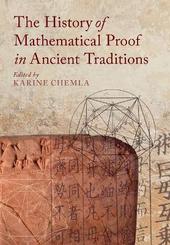
|
The History of Mathematical Proof in Ancient Traditions
Paperback / softback
Main Details
| Title |
The History of Mathematical Proof in Ancient Traditions
|
| Authors and Contributors |
Edited by Karine Chemla
|
| Physical Properties |
| Format:Paperback / softback | | Pages:614 | | Dimensions(mm): Height 245,Width 170 |
|
| Category/Genre | Western philosophy - Ancient to c 500
History of mathematics
History of science |
|---|
| ISBN/Barcode |
9781107527539
|
| Classifications | Dewey:511.3601 |
|---|
| Audience | | Professional & Vocational | |
|---|
| Illustrations |
29 Tables, black and white; 14 Halftones, unspecified; 79 Line drawings, unspecified
|
|
Publishing Details |
| Publisher |
Cambridge University Press
|
| Imprint |
Cambridge University Press
|
| Publication Date |
21 May 2015 |
| Publication Country |
United Kingdom
|
Description
This radical, profoundly scholarly book explores the purposes and nature of proof in a range of historical settings. It overturns the view that the first mathematical proofs were in Greek geometry and rested on the logical insights of Aristotle by showing how much of that view is an artefact of nineteenth-century historical scholarship. It documents the existence of proofs in ancient mathematical writings about numbers and shows that practitioners of mathematics in Mesopotamian, Chinese and Indian cultures knew how to prove the correctness of algorithms, which are much more prominent outside the limited range of surviving classical Greek texts that historians have taken as the paradigm of ancient mathematics. It opens the way to providing the first comprehensive, textually based history of proof.
Author Biography
Karine Chemla is Senior Researcher at the CNRS (Research Unit SPHERE, France) and a Senior Fellow at the Institute for the Study of the Ancient World at New York University. She is also Professor on a Guest Chair at Northwestern University, Xi'an, as well as at Shanghai Jiaotong University and Hebei Normal University, China. She was awarded a 'Chinese Academy of Sciences Visiting Professorship for Senior Foreign Scientists' in 2009.
Reviews'This radical, profoundly scholarly book explores the purposes and nature of proof in a range of historical settings. It overturns the view that the first mathematical proofs were in Greek geometry and rested on the logical insights of Aristotle by showing how much of that view is an artefact of nineteenth-century historical scholarship. It documents the existence of proofs in ancient mathematical writings about numbers and shows that practitioners of mathematics in Mesopotamian, Chinese and Indian cultures knew how to prove the correctness of algorithms, which are much more prominent outside the limited range of surviving classical Greek texts that historians have taken as the paradigm of ancient mathematics. It opens the way to providing the first comprehensive, textually based history of proof.' Jeremy Gray, Open University 'At long last, a substantial single volume on the history of ancient mathematics makes the cutting-edge research of scholars, some of whom normally publish in other languages, accessible to the English speaking reader ... this volume is a milestone - the history of ancient mathematics has its very own French revolution, and it has finally crossed the Channel.' Serafina Cuomo, British Journal for the History of Science '... a collection of meticulous, expert studies of ancient mathematical texts. The individual chapters are essential reading for historians of geometry and arithmetic, and the volume, as a whole, will no doubt become canonical in the history of mathematics. Together, Karine Chemla and her ensemble of scholars successfully make the case for revising the nineteenth-century portrait of the history of mathematical proof that prevails even today. We must question the critical editions we employ, and we must expand the history of mathematical proof to include algorithmic texts in the Greek, Mesopotamian, Indian, Chinese, and Islamic traditions.' Early Science and Medicine 'The purpose of the book ... is to challenge the standard narrative and design a research program to replace it with a more adequate assessment of the achievements of non-Greek mathematicians in antiquity. The pivotal question is, in what sense and by what methods were mathematical procedures justified in showing that they always produce correct results when applied?' Jochen Bruning, Common Knowledge
|